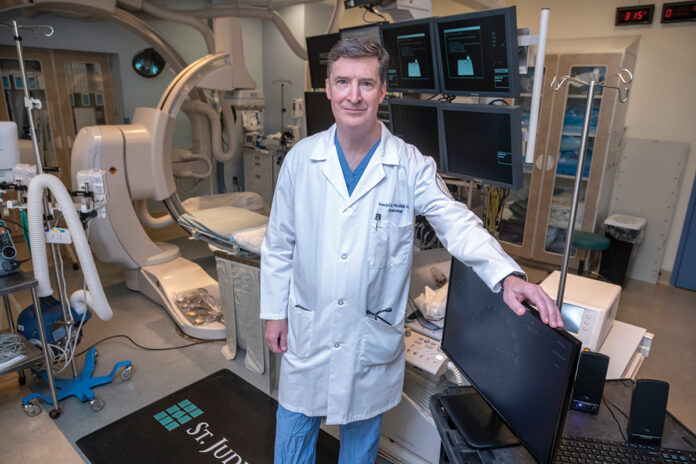
A new artificial intelligence technology is helping physicians perform ablations – minimally invasive surgeries used to treat certain heart conditions – more efficiently, and only 11 U.S. hospitals are using it.
One of them is in Rhode Island.
Rhode Island Hospital became the first hospital in New England to use Volta Medical Inc.’s VX1 artificial intelligence software, designed to help treat persistent atrial fibrillation as part of a national study led by Volta, a company with headquarters in Providence and France.
“It’s very exciting for all of us to be in Providence, which is also the headquarters for Volta, and be able to participate with Lifespan [Corp., owner of Rhode Island Hospital] and Brown [University] in this cutting-edge innovation,” said Dr. Daniel Philbin, cardiac electrophysiologist and director of the arrhythmia service at the Lifespan Cardiovascular Institute.
Atrial fibrillation is a heart condition that causes the heart to beat much faster than normal. It occurs when the beating in the upper heart chambers is irregular, which causes the blood not to flow correctly to the lower chambers. The condition can lead to dizziness, chest pains and more-serious health issues such as heart failure, blood clots and stroke.
With an estimated 12.5 million cases worldwide, atrial fibrillation is the most common type of treated heart arrhythmia. In Rhode Island alone, about 5,500 people suffer from atrial fibrillation.
While the condition sometimes disappears on its own, in other cases treatment is necessary, which can vary from lifestyle changes or medications to surgical procedures in more-severe cases.
The most common surgical treatment is ablation, a surgery that burns or freezes tissue to create small scars on the heart to block the electrical signals causing irregular heartbeats.
Ablations are usually performed using a catheter that is fed through the blood vessels and into the heart. It is usually up to the physician to identify the best areas on the heart for ablation. But the procedure does not always fix the irregularities.
With Volta VX1, targeting those optimum areas should be made easier because the software analyzes the patient’s electrograms in real time and communicates with the surgeon where to freeze or burn tissues through a 3D map of the heart on a nearby monitor.
How? The software consults an electronic library that holds information from thousands of patients who have undergone successful ablations and, using a machine-learning algorithm, guides the doctor on where to make the lesions so that they are most likely to work.
“There’s no other technology out there that has real data from an actual case,” said Jeff Martin, vice president of marketing for Volta, a health technology company that has offices in Marseille, France, and employs about 10 people in Rhode Island. “That’s why I think this technology is truly unique because of the machine-learning aspect of using actual case information.”
The hope is that this software will make ablation more effective on people with persistent atrial fibrillation – people who have suffered from it for several consecutive days and need treatment. In those cases, ablation can sometimes fail at permanently curing the condition and a second or third procedure is necessary. But this software will help tailor those ablations and increase their likelihood of success.
“It’s very debilitating as a patient and if you have to do multiple procedures, it can be really tough,” Martin said. “Our goal is to reduce the amount of redo procedures, or if you have a redo procedure, make sure it’s effective.”
Between 2017 and 2021, more than 1,400 ablations were performed across the entire Lifespan system, says Renee Bernard, the director of Lifespan’s cardiovascular services. At Rhode Island Hospital, 671 ablations were performed between 2016 and 2021, according to Philbin. Of those, 34 were performed using VX1.
The study that the hospital is participating in started last year, but enrollment will continue until early 2023. Martin says researchers are expecting to have results in early 2024. The goal is to assess whether the use of Volta’s equipment improves the success rate of ablations.
Eleven hospitals in the U.S. and 12 in Europe are participating in the randomized study, which will involve 382 patients. Hospitals were chosen based on the number of patients with persistent atrial fibrillation and based on their equipment and systems.
Final results from the study are still over one year away, but previous clinical studies conducted by Volta showed promise. In recent studies, ablating the areas of interest indicated by the software led to an almost 90% success rate for termination of the arrhythmia, Martin says.
“We’ve had the software for a little under two years,” Philbin said. “We have found it to be very promising.”
VX1 is not available commercially yet, despite having received U.S. Food and Drug Administration approval in 2020 and earning a similar approval in the European Union. But Volta is planning to do a limited market release in 2023 and to fully launch the product once the final results of the study are in.
“It will be likely to help a lot of patients,” Philbin said.











